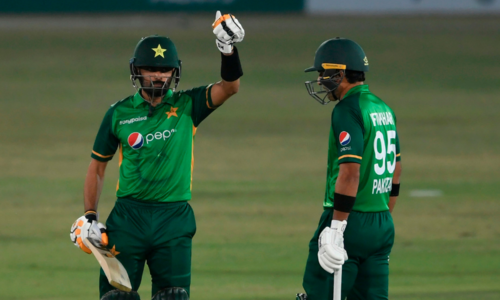BABAR Azam is now fully loaded with authority and responsibility. The batting prodigy has now been handed the reins of the Test team too, along with the ODI and T20 leadership, after the Pakistan Cricket Board (PCB) took back the mantle from Azhar Ali who proved an obvious flop against top-shelf opponents like Australia and England during his one-year stint in the hot seat.
The change of guard had been very much on the cards, not just because Pakistan under Azhar lost high-profile series — first in Australia late last year and in England earlier this year — but also due to the unconvincing way he marshalled his troops under a number of testing situations.
The PCB’s decision to remove Azhar, however, appears only half correct. It is very difficult to comprehend the logic behind the appointment of 26-year-old Babar — the mainstay of Pakistan’s ever-fragile batting line-up — as the captain of the national side in the five-day format at the present stage of his thriving international career.
Babar is already leading the country in limited over formats which is enough burden for him already. The right-hander is Pakistan’s rock-solid batsman on whom the entire team heavily depends.
After becoming Pakistan’s highest scorer at the 2019 World Cup in England, this sensational player continued to excel and smashed a hundred and a 90-plus score in the two Tests in Australia. Earlier in 2018, this elegant timer of the ball impressed on the fast and bouncy tracks of South Africa on his very first Test tour to that country. He is the only top-class batsman in the national team performing consistently during the last couple of years, and of course can serve Pakistan cricket for many more years to come.
But rather than letting him play freely, grow and enjoy his run as a world-class professional, the PCB has put him under more pressure by handing him the Test captaincy.
Will this move come off? While one should always keep good hopes, the scenario prevailing in the current PCB regime suggests the decision has largely been taken in haste and without considering all aspects and factors.
Will Babar be able to properly handle the three-fold burden of captaincy? What if his batting takes a dip? If that happens, it will surely impact the national team’s performance. Just assume, if the Lahore-born cricketer who is a prime asset of Pakistan cricket, fails to deliver and is eventually removed from the helm, what choice will then the PCB have for leadrship? And can the PCB high-ups guarantee that Babar’s confidence level as batsman will be the same after his removal?
If the PCB does have a plan-B in case Babar as captain falls apart, then one reckons that plan should have been studied and considered as the top preference instead of burdening Babar in all three formats.
Not everybody is a born leader! Ask the admirers of legends like Sir Clive Lloyd, Sir Vivian Richards, Steve Waugh, Imran Khan, Javed Miandad and Mahendra Singh Dhoni — all successful leaders — and they would endorse. Coming to the modern-era game, compare the case of Babar with India’s Virat Kohli, arguably the world’s best batsman now leading India across the three formats. Kohli possesses a naturally aggressive approach to the game which gives him a specific knack of captaincy, whereas Babar has a sedate and calm personality and is mainly focussed on developing the art of sublime batting for which he is known.
Babar is six years younger to Kohli and, though he matches the Indian maestro in batting prowess, he seems to be lacking the innate aggression required to lead the side. And if he doesn’t have that sort of aggression now, Babar cannot and will not be able to develop it in the future as well.
The critics feel that 31-year-old Shan Masood, who has raised his batting quality lately to become a permanent part of the Test side, could certainly have been given the Test captaincy, at least for the upcoming New Zealand tour, if not for a longer period. The left-handed opener has a mature personality with a vast experience of first-class cricket and has led Southern Punjab to the top at the end of third round in the ongoing Quaid-e-Azam Trophy.
However, it seems, the PCB has other ideas and wants to give Babar a chance to manage multiple leadership roles without actually realising that the decision can badly backfire, both for Babar and Pakistan.
PCB chairman Mr Ehsan Mani and CEO Mr Wasim Khan should remember the result of saddling Misbah-ul-Haq with three jobs simultaneously — that of head coach, chief selector and batting coach — and just how that decision has backfired.
Misbah’s stepping down as chief selector after little over a year and Younis Khan’s appointment as batting coach (which was extended to 2022 T20 World Cup on Thursday by the PCB) are enough to show that while the writing was always on the wall, the Board officials could never read it.
In this regard, perhaps the PCB officials concerned can also study the story of England’s rise to the top after their pathetic exit in the 2015 World Cup. Split captaincy has done wonders for them in this era of hectic schedules featuring three formats plus the T20 leagues. So why can’t it work for Pakistan?
Published in Dawn, November 13th, 2020














































